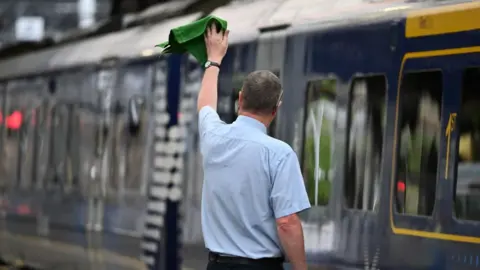ScotRail workers to go on strike in October
 Getty Images
Getty ImagesWorkers at ScotRail are to go on strike next month in a dispute over pay.
Members of the Rail, Maritime and Transport (RMT) union at ScotRail will walk out on Monday 10 October after rejecting a 5% pay rise.
The union said the pay offer was an effective wage cut for its members because of the soaring rate of inflation.
ScotRail has said the industrial action will have "significant consequences" on the service it can offer that day.
The strike is part of a wave of industrial action on the railways across the UK.
Services are also expected to face disruption on 1 October and 8 October because of national strikes at Network Rail - which is responsible for signalling and the track.
RMT general secretary Mick Lynch said: "ScotRail knows this offer is not good enough and needs to take into account the escalating cost-of-living crisis.
"Our members refuse to be made poorer and will exercise their industrial strength to let ScotRail know that they will not rest until they are paid what they deserve."
Strike action by the RMT in August saw most of ScotRail's services cancelled with just 11 routes in the central belt, Fife, and the Scottish Borders operating.
Phil Campbell, ScotRail's head of customer operations, said: "This will have significant consequences for the service we are able to offer our customers.
"We will update our customers in the coming days on the full extent of the impact of industrial action."


Railway passengers have faced months of disruption but this will be the first strike at ScotRail.
For two months, ScotRail had to run an emergency timetable because drivers were turning down overtime because of a pay row.
And since the summer ScotRail services faced disruption because of national strikes at Network Rail, which is responsible for the signals and the track.
The pay offer rejected by the RMT is similar to the one accepted by members of the drivers' union Aslef. This means it could be difficult for ScotRail to improve on the basic pay offer without reopening the row with Aslef too.
It could potentially try to get round this by looking at things like allowances, the wages of lower paid staff or whether individual jobs deserve higher pay.
However this impending strike is yet another example of a pay dispute caused by high inflation.
